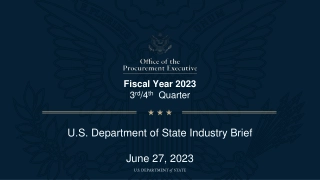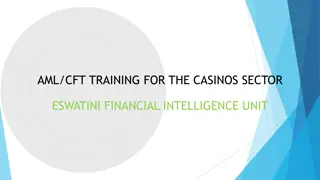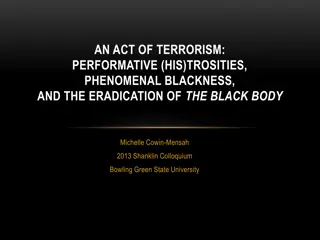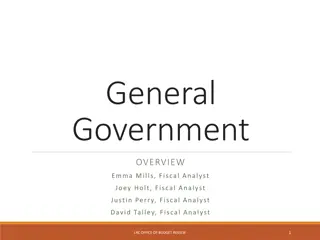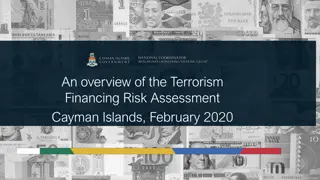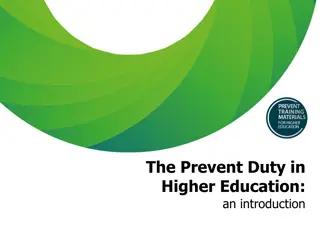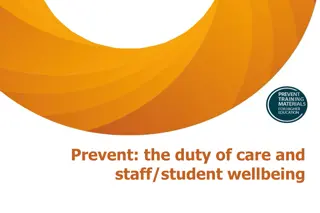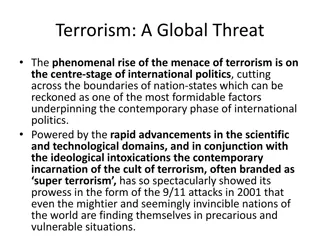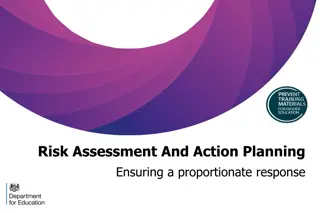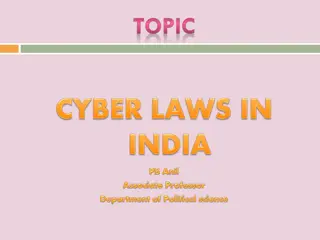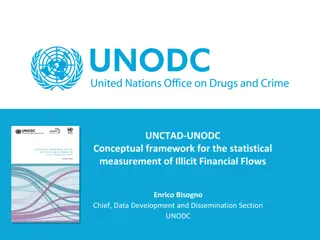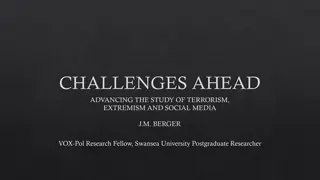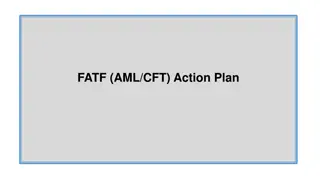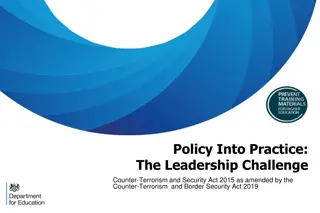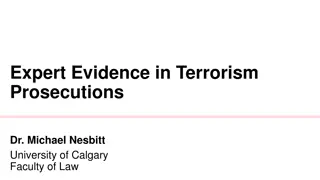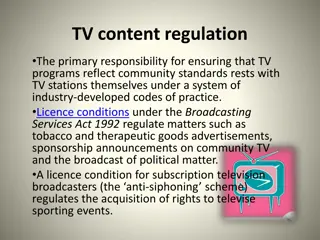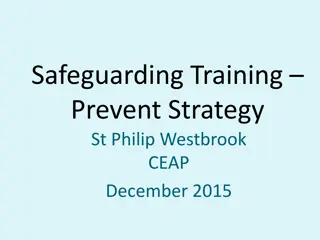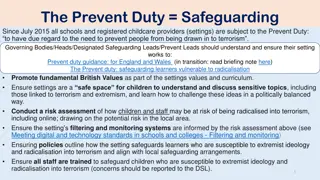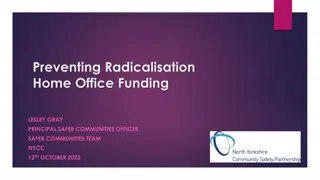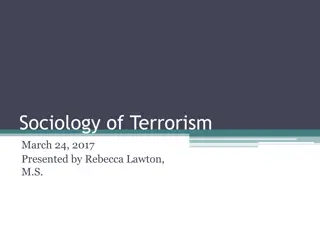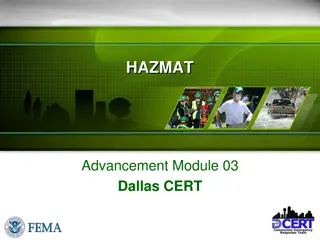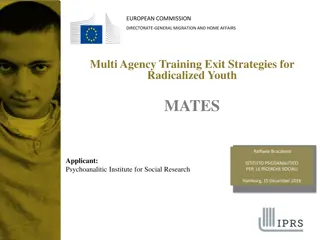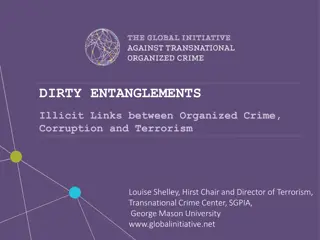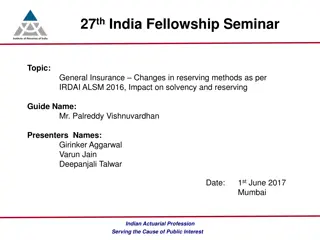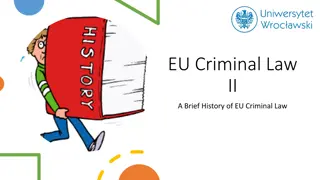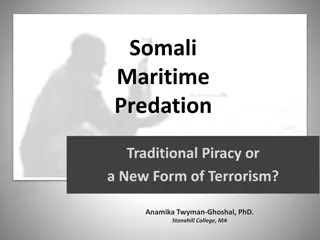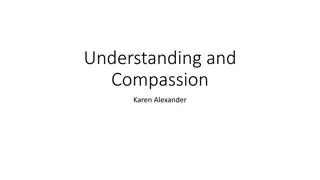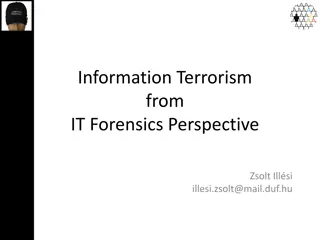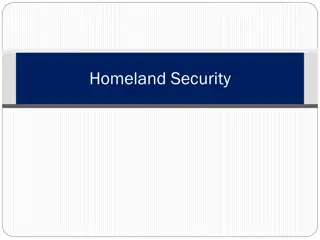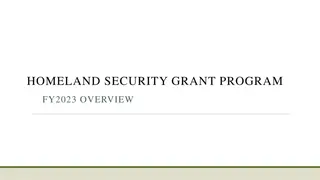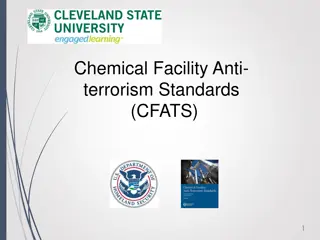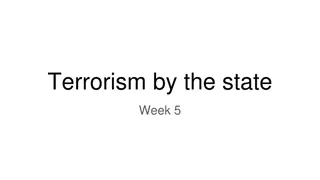Global Antiterrorism Training Assistance Program Overview
Learn about the Global Antiterrorism Training Assistance Program (GATA III) managed by the U.S. Department of State's Office of Antiterrorism Assistance. The program provides counterterrorism training globally and builds Partner Nation capabilities to combat terrorism effectively. Discover how it su
1 views • 44 slides
Understanding Anti-Money Laundering (AML) and Combating Financing of Terrorism (CFT) Framework
Learn about the essential components of Anti-Money Laundering (AML) and Combating the Financing of Terrorism (CFT) framework, including regulatory obligations, objectives, money laundering processes, stages, sanctions, and regulatory overview. Discover how money laundering, terrorist financing, and
1 views • 30 slides
AML/CFT Training for Casinos Sector - Eswatini Financial Intelligence Unit
Explore the comprehensive AML/CFT training program for the casinos sector by the Eswatini Financial Intelligence Unit. Covering regulatory frameworks, money laundering, terrorism financing, AML program overview, critical pillars, FATF standards, and domestic regulations. Learn about the Swaziland Fi
5 views • 27 slides
The Eradication of the Black Body: A Critical Analysis
Michelle Cowin-Mensah's research delves into the performative aspects of terrorism, racial profiling, and the dehumanization of the black body. Through the lens of performance studies, she explores how societal behaviors perpetuate systemic injustice and erode the emotional relevance of black indivi
2 views • 12 slides
FICA Presented by: Robert Krautkramer
FICA, presented by Robert Krautkramer, aims to create transparency in financial transactions to combat money laundering and terrorism financing. The content explains the concepts of money laundering, the risk-based approach for accountable institutions, and the specific requirements for AIs to compl
2 views • 33 slides
Future Challenges and Opportunities in the Asia-Pacific Region
The rapid acceleration of societal development, as highlighted by Alvin Toffler, coupled with sudden and revolutionary changes in various aspects of human life, presents both prosperity and challenges. The future trends indicate increasing complexity, necessitating collaboration, interdependence, an
1 views • 20 slides
Practice Areas - Aegle Marmelos Law Firm in Chennai & Madurai
Practice Areas - Aegle Marmelos Law Firm in Chennai & Madurai\n\n\u2022\tCriminal:\nViolent crimes (murder, assault)\n\u2022\tSexual offenses (rape, harassment)\n\u2022\tProperty crimes (theft, burglary)\n\u2022\tFinancial crimes (fraud, embezzlement)\n\u2022\tCybercrimes (hacking, online fraud)\n\u
0 views • 4 slides
Kentucky State Government Budget Overview
Kentucky state government budget overview includes expenses for the Governor's office, Office of Minority Empowerment, Governor's Office of Policy and Management, Homeland Security, Law Enforcement Protection Program, Veterans Centers, and more. Various departments and divisions are responsible for
1 views • 22 slides
Terrorism Financing Risk Assessment in Cayman Islands (February 2020)
The Terrorism Financing Risk Assessment in Cayman Islands, conducted in February 2020, analyzed data on cross-border fund flows, trade statistics, intelligence on terrorism financing, and more. The assessment identified high-risk jurisdictions and utilized the FATF's guidance to assess risks related
2 views • 16 slides
Understanding the Prevent Duty in Higher Education
This introduction module provides essential information on the Prevent Duty in higher education, outlining its statutory requirements and objectives. It covers topics such as the Counter-Terrorism and Security Act 2015, the process of radicalization, and strategies to prevent individuals from being
0 views • 37 slides
Understanding Prevent Duty in Higher Education: Care, Wellbeing & Support
The Prevent duty in higher education requires specified authorities to prevent individuals from being drawn into terrorism. Alongside duty of care, institutions must safeguard staff and student wellbeing while identifying and supporting at-risk students. Effective pastoral care and policies for pray
2 views • 25 slides
Terrorism: A Global Threat in International Politics
The rise of terrorism as a global menace is a significant factor in contemporary international politics. Fueled by advancements in technology and ideology, terrorism poses a formidable challenge, exemplified by events like the 9/11 attacks. Efforts are needed to combat terrorism on both national and
0 views • 24 slides
Effective Strategies for Preventing Terrorism: Risk Assessment and Action Planning
Counter-Terrorism and Security Act 2015 mandates Higher Education providers to conduct risk assessments to prevent students from being drawn into terrorism. Understanding the law and compliance requirements is crucial, followed by developing a thorough action plan driven by risk analysis. The plan s
0 views • 21 slides
Understanding Cyber Laws in India
Cyber law in India encompasses the regulations governing cyber crimes, including theft, fraud, defamation, and more under the Indian Penal Code. The Information Technology Act of 2000 addresses modern crimes like cyber terrorism and credit card frauds. The necessity for cyber laws in India arises fr
0 views • 13 slides
Understanding Illicit Financial Flows and Their Implications
This content delves into the conceptual framework for measuring Illicit Financial Flows (IFFs), highlighting how IFFs intersect with various policy agendas such as tax evasion, corruption, and terrorism financing. It also emphasizes the importance of addressing IFFs for sustainable development, peac
1 views • 10 slides
Advancing Research on Terrorism, Extremism, and Social Media Challenges
Delve into the complexities of terrorism and extremism studies, uncovering the nuances between violent extremism and terrorism, challenging existing definitions, and exploring the evolving fields in the realm of social media. The discourse navigates the shifting focus, the definitions of terrorism a
0 views • 9 slides
Enhancing AML/CFT Measures: Overview of Mauritius' FATF Action Plan Implementation
Mauritius has made significant progress in implementing the FATF Action Plan to combat money laundering and terrorism financing. Key achievements include developing a Risk-Based Supervision plan, ensuring access to beneficial ownership information, and enhancing capabilities for conducting investiga
1 views • 8 slides
Leadership Responsibilities in Counter-Terrorism Policies
Leadership roles under the Counter-Terrorism and Security Act involve establishing mechanisms to understand radicalization risks, ensuring staff capabilities to address these risks, promoting duty importance, and maintaining effective policy implementation. Governing bodies must provide annual assur
0 views • 16 slides
Analysis of Expert Evidence in Terrorism Prosecutions
The data presented highlights statistics on resolved terrorism prosecutions, including conviction rates, gender proportions, involvement of experts, categories of expert evidence, and the treatment of experts by judges. The analysis includes details on the types of expert evidence used, appearances
4 views • 10 slides
Television Content Regulation in Australia
Television content regulation in Australia is overseen by industry-developed codes of practice and specific licence conditions under the Broadcasting Services Act 1992. TV stations hold the primary responsibility to ensure that programs reflect community standards. Regulations cover areas such as to
0 views • 12 slides
PREVENT Strategy Implementation in Sheffield Schools: Autumn/Winter 2015-16
Raising awareness of the PREVENT strategy in Sheffield schools during the Autumn/Winter term of 2015-16 is crucial for safeguarding and preventing individuals from supporting terrorism. The strategy emphasizes the duty of schools to address all forms of terrorism through various initiatives like wor
0 views • 16 slides
Understanding the Prevent Duty in Safeguarding Training at St. Philip Westbrook CEAP
In the Prevent Strategy training session at St. Philip Westbrook CEAP in December 2015, participants were educated on the Prevent duty outlined in the Counter-Terrorism and Security Act 2015. The session aimed to clarify the responsibilities of schools and childcare providers in preventing individua
0 views • 25 slides
Safeguarding Against Terrorism: The Prevent Duty in Education Settings
Since July 2015, schools and childcare providers must comply with the Prevent Duty to prevent individuals from being radicalized into terrorism. This duty involves promoting British values, conducting risk assessments, training staff, and making referrals when necessary. Prevent training is essentia
0 views • 7 slides
Understanding Prevent Duty Guidance in the UK Education Sector
Statutory guidance under the Counter Terrorism and Security Act 2015 outlines the Prevent Duty, requiring authorities to prevent individuals from being drawn into terrorism. The guidance specifies responsibilities for various sectors, including local authorities, police, education, health, and crimi
0 views • 50 slides
Enhancing Counter Terrorism Efforts Through Community Partnerships
The Prevent CSO Strategy focuses on aligning partnerships with Counter Terrorism objectives to address radicalization causes and provide early interventions. A new Funding Model administered by Groundwork aims to empower Local Authorities to bid for Prevent projects. The Counter Terrorism Local Prof
0 views • 8 slides
Sociology of Terrorism: Understanding the Dynamics and Impacts
Delve into the intricate world of terrorism with a focus on analysis, identification, and stages leading to radical actions. Explore the social, political, and historical context behind terrorism, emphasizing the importance of understanding individual perpetrators. Uncover the complexities of justif
0 views • 38 slides
HAZMAT and Terrorism Response Protocols
This module covers HAZMAT awareness, safety protocols, and CERT tasks in dealing with hazardous materials incidents. It also provides guidance on recognizing and responding to potential terrorism incidents. Key topics include using the Emergency Response Guidebook, CERT team responsibilities, victim
0 views • 57 slides
Multi-Agency Training for Radicalized Youth: Defeating Terrorism through Desensitization
This project, led by the European Commission, aims to combat radicalization and terrorism by implementing multi-agency training programs focused on social reintegration, prevention of recruitment, and increasing motivation among young individuals. Partnering with several universities and organizatio
0 views • 20 slides
Understanding Extremist Risks: Insights and Strategies
Explore the complexities of extremist risk through a lens of psychological and contextual analysis. Delve into the nature of terrorism, different types of terrorism, and the importance of robust risk assessment in preventing, pursuing, protecting, and preparing against terrorist activities.
0 views • 21 slides
The Interplay of Organized Crime, Corruption, and Terrorism
Complex interconnections exist between organized crime, corruption, and terrorism, with almost all terrorist groups funded by criminal activities. These illicit ties create challenges for regional and global stability, undermining development opportunities. The United Nations has recognized the link
0 views • 12 slides
Challenges in Pricing Cyber Risk and Terrorism Risk: Impact on Solvency and Reserving Methods
The seminar discusses the challenges in pricing cyber risk and terrorism risk, with a focus on changes in reserving methods as per IRDAI ALSM 2016 and their impact on solvency and reserving. Key areas of consideration under ALSM 2016, valuation of assets, estimation of liabilities, and more are cove
0 views • 21 slides
Evolution of EU Criminal Law Through Cooperation and Commitment
The history of EU criminal law traces back to the Treaty of Rome in 1957 when the EU initially focused on economic matters. Over the years, with the judgment in the Stauder case in 1969 and the formation of the TREVI group in the 1970s, cooperation on security and combating terrorism laid the founda
0 views • 59 slides
Understanding Somali Maritime Predation: Piracy or Terrorism?
Delve into the complexities of Somali maritime predation, questioning whether it falls under traditional piracy or is evolving into a new form of terrorism. Explore the distinct characteristics, international legal definitions, and policy implications surrounding this critical issue.
0 views • 19 slides
Understanding Social Progress and Terrorism: Factors and Solutions
Exploring the socio-economic factors contributing to terrorism and hindering social progress, this content delves into the correlation between unemployment, state repression, violence, and terrorism. Key factors analyzed include weak state capacity, corruption, extremist ideologies, and social injus
0 views • 15 slides
Evolution of Indo-US Relations in the 21st Century
Indo-US relations have evolved significantly post the bilateral nuclear agreement in 2005. The relationship has moved beyond cold war dynamics to encompass cooperation in various spheres such as security, clean energy, democracy promotion, health, cyber security, and terrorism. There is a growing co
0 views • 28 slides
Insights into Information Terrorism from IT Forensics Perspective
Delve into the world of terrorism and information technology through the lens of IT forensics. Explore topics such as the uncertainties surrounding cybersecurity and digital crimes, the role of security players, Locard's Exchange Principle, computer investigations, evidence analysis, investigator qu
0 views • 15 slides
Understanding Homeland Security in the United States
Homeland security in the United States encompasses measures aimed at preventing terrorist attacks, reducing vulnerability to terrorism, and aiding in recovery from attacks. Key aspects include the Homeland Security Act of 2002 which established the Department of Homeland Security and the focus on ho
0 views • 13 slides
Vermont Homeland Security Grant Program FY2023 Overview
The Vermont Homeland Security Unit plays a crucial role in supporting efforts to prevent, protect against, and prepare for terrorism in the state. The grant programs, including State Homeland Security Grant Program (SHSP) and Operation Stonegarden (OPSG), aim to enhance preparedness and security acr
0 views • 20 slides
Understanding Chemical Facility Anti-Terrorism Standards (CFATS)
Congress passed the Department of Homeland Security Act in 2007, granting DHS the authority to regulate high-risk chemical facilities and develop security regulations. CFATS, effective since 2007, requires high-risk facilities to enhance security. The regulations empower DHS to audit, inspect, and e
0 views • 13 slides
Understanding State Terrorism and Its Implications on Society
State terrorism, employed by governments or factions within them, poses a grave threat to citizens and international peace. This form of terrorism includes intimidation, coerced conversion, and genocide as tools to maintain control. Dictators find it easier to carry out state terrorism in secret, of
0 views • 7 slides
